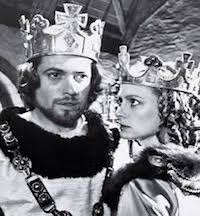

Freshly edited text based on the best early printed version of the play The line is blurred between Macbeth’s evil and his opponents’ good, and there are new attitudes toward both witchcraft and gender.

Recently, it has been applied to nations that overreach themselves and to modern alienation. Its story was once seen as that of a hero who commits an evil act and pays an enormous price. Like other plays, Macbeth speaks to each generation.

Is Macbeth tempted by fate, or by his or his wife’s ambition? Why does their success turn to ashes? In depicting a man who murders to become king, Macbeth teases us with huge questions. He found a spectacle of violence and stories of traitors advised by witches and wizards, echoing James’s belief in a connection between treason and witchcraft. London was alive with an interest in all things Scottish, and Shakespeare turned to Scottish history for material. In 1603, James VI of Scotland ascended the English throne, becoming James I of England.

Garnet’s defence of equivocation was extremely damaging in his trial, and the Porter’s light-hearted remarks seem to be playing on popular derision of the priest.The authoritative edition of Macbeth from The Folger Shakespeare Library, the trusted and widely used Shakespeare series for students and general readers. Jesuits were particularly associated with equivocation, which is a way of avoiding the sin of lying by implying something untrue through ambiguous phrasing. Allegedly, Garnet had heard confession from Robert Catesby, one of the plotters, which revealed his intention to kill the King, but obeyed the Seal of the Confessional by keeping it secret. The insistent reference to equivocation seems to be alluding to the Catholic priest Henry Garnet, who was hung, drawn and quartered for his role in the Gunpowder Plot and was deeply criticised for equivocating. Knock, knock! Who’s there, in the other devil’s name? Faith, here’s an equivocator that could swear in both the scales against either scale, who committed treason enough for God’s sake, yet could not equivocate to heaven. At the beginning of Act 2, Scene 3, the Porter amuses himself by pretending he is the gatekeeper of hell, letting in new arrivals.


 0 kommentar(er)
0 kommentar(er)
